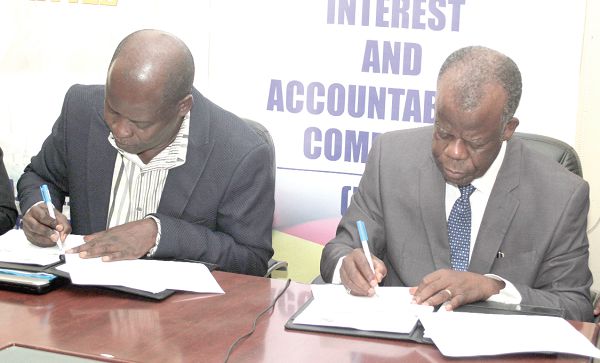
PIAC, EOCO partner to ensure efficient petroleum revenue mgt
The Public Interest and Accountability Committee (PIAC) has signed a Memorandum of Understanding (MoU) with the Economic and Organised Crime Office (EOCO) for the latter to investigate report findings of the PIAC.
The PIAC will also sign similar memoranda with other anti-crime agencies such as the Special Prosecutor and the Attorney General (AG).
Advertisement
Although PIAC, by its mandate, is to ensure the efficient management of petroleum revenues for sustainable development, it has no legal backing to investigate or prosecute offenders, hence the need for it to collaborate with bodies that have prosecutorial powers.
The MoU
The working relationship between the two organisations will include the submission of copies of PIAC’s reports to EOCO, highlighting relevant sections that require consideration and further investigations.
It will also include furnishing EOCO with accompanying documents that relate to the highlighted section and availing itself to EOCO during the investigations where and when necessary.
Under the MoU, EOCO is also expected to update PIAC at regular intervals on the progress of its investigations on matters referred to it by PIAC.
Upon the conclusion of its investigations into matters referred to it by PIAC, EOCO is further expected to submit a formal report to PIAC, highlighting its investigative findings and intended actions.
EOCO boss
The Executive Director of EOCO, ACP Mr K. K. Amoah (retd), who signed on behalf of the office, said EOCO, by law, was mandated to investigate and process for prosecution matters that affected the economy and, therefore, the MoU with the PIAC was in the right direction.
He explained that the EOCO could only investigate issues when they were reported to it and, therefore, a collaboration with PIAC would help EOCO initiate more investigative work in future.
He said over the years, the office had been collaborating with other agencies locally and internationally, such as the Food and Drugs Authority (FDA) and the Economic and Financial Crimes Commission (EFCC), a Nigerian law enforcement agency that investigates financial crimes such as advance fee fraud and money laundering.
He said although EOCO would make its findings available to the PIAC, the final decision to prosecute would rest with the Attorney General, with whom the final report would be lodged.
PIAC’s work
On Wednesday, April 11, 2018, the Daily Graphic reported on one of the numerous findings of PIAC which said projects said to have been financed with oil revenues were non-existent.
The story said following the initial inspection of projects in the then three regions of the north, PIAC wrote to the Ministry of Finance on August 4, 2016 for explanation on the non-existent projects but the letter was not acknowledged, let alone acted upon.
Why an MoU
The Chairman of PIAC, Dr Steve Manteaw, before signing the MoU on behalf of the committee, said the two entities, with distinct but mutually reinforcing mandates, had agreed to work together to protect the country’s petroleum revenues “from wanton embezzlement and criminal abuse”.
He said shedding light on what appeared to be criminal conduct on the part of some public officials, with respect to the use of petroleum revenues, without holding such people to account did not in any way serve the accountability mandate that could be inferred from its name.
“And yet we have been constrained by the fact that our statute of establishment did not provide us with the legal capacity to enforce our recommendations,” he added.
Dr Manteaw said the collaboration would serve as a useful example of how state agencies with similar mandates could collaborate, rather than compete to achieve their common objective.
Mandates
PIAC is a statutory institution committed to ensuring efficient, transparent and accountable management of petroleum revenues and investments to secure the greatest social and economic benefit for the people of Ghana through active engagement with the government and citizens.
EOCO’s mandate is to investigate and on the authority of the Attorney-General, prosecute serious offences that involve financial or economic loss to the State, money laundering, human trafficking, prohibited cyber activity, tax fraud and other serious offences.



